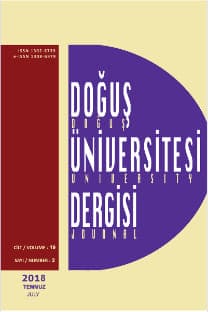TÜRKİYE'DE İSLAMİ VE GELENEKSEL BANKALARIN MÜŞTERİ FARKINDALIĞI VE SEÇİM KRİTERLERİNİN DEĞERLENDİRİLMESİ
Katılım Bankacılığı, İslam Bankacılığı, Ticari Bankacılık, Müşteri Seçimi, Türkiye
ASSESSING CUSTOMER AWARENESS AND SELECTION CRITERIA OF ISLAMIC AND CONVENTIONAL BANKS IN TURKEY
___
- Ahmad, A., K. Rehman, and Saif I. (2010). Islamic banking experience of Pakistan: Comparison between islamic and conventional banks. International Journal of Business and Management, 5(1), 37-144.
- Ali L., Ali A. and Khwaja H. (2013). Comparison of islamic and conventional banking on the basis of riba and services. International Review of Management of Business Research, 2(3), 837-846.
- Asutay, M. E. and Ergec H. (2013). Searching fort he nexus between money, deposits, and loans (financing) in Malaysian and Turkish islamic and conventional banking: A comparative analysis (2007-2013). Afro Eurosian Studies, 2(1-2), 72-90.
- Banking Regulation and Supervision Agency, (2006). Retrieved from http://www.bddk.org.tr
- Cattelan, V. (2013). Islamic finance in Europe: Towards a plural financial system. Italy, Edward Elgar Publishing.
- Dusiki, A.W. and Irwani N. A. (2007). Why do Malaysian customers patronise islamic banks? International Journal of Bank Marketing, 24(3), 42-160.
- Ernst & Young Global Limited (2014). World Islamic Banking Competitiveness Report 2014- 2105 Participation Banking 2.0.United Kingdom.
- Erol C., Baklacı H. F., Aydog B. and Tunc G. (2014). Performance comparison of islamic (participation) banks and commercial banks in Turkish banking sector. EuroMed Journal of Business, 9(2), 114-128.
- Farooq, S. U., Ahmad, G. and Jamil S. H. (2010). A profile analysis of the customers of islamic banking in Peshawar, Pukhtunkhwa. International Journal of Business and Management, 5(11), 106-117.
- Gaith, A. and Worthington A. (2008). An empirical survey of individual consumer, business firm and financial institution attitudes towards islamic methods of finance. International Journal of Social Economics, 35(11), 783-808.
- Hanif, M. (2011). Differences and similarities in islamic and conventional banking. International journal of Business of Social Science, 2(2), 166-175.
- Hegazy, I. A. (1995). An empirical comparative study between islamic and commercial banks selection criteria in Egypt. International Journal of Commerce and Management, 5(3), 46-61.
- Hossain, M. and Leo, S. (2009). Customer perception on service quality in retail banking in Middle East: The case of qatar. International Journal of Islamic and Middle Eastern Finance and Management, 2(4), 338-350.
- Ibrahim, W.H.W. and Ismail A.G. (2015). Conventional bank and islamic banking as institutions: Similarities and differences. Humanomics, 31(3), 272-298.
- Lee, K., and Ullah, S. (2011). Customers' attitude toward islamic banking in Pakistan. International Journal of Islamic and Middle Eastern Finance and Management, 4(2), 131-145.
- Metawa, S. A. and Almossawi M. (1998). Banking behaviour of islamic bank customers: Perspectives and implications. International Journal of Bank Marketing, 6(7), 299-313.
- Miah, Md D. and Kashfia S. (2015). Relationship between capital, risk and efficiency a comparative study between islamic and conventional banks of Bangladesh. International Journal of Islamic and Middle Eastern Finance and Management, 8(2), 203-221.
- Mokni R. B. S. and Rachdi H. (2014). Assessing the bank profitability in the Mena Region a comparative analysis between conventional and islamic bank. International Journal of Islamic and Middle Eastern Finance and Management, 7(3), 305-332.
- Naser, K., A. Jamal, and Al-Khatib K. (1999). Islamic banking: A study of customer satisfaction and preferences in Jordan. International Journal of Bank Marketing, 17(3), 135-150.
- Okumus, H. S. (2003). Performance of Turkish banking and measure of value added. Marmara University Institute of Social Sciences Journal, 5(19), 3-18.
- Okumus, H.S. (2005). Interest free banking in Turkey: A study of customer satisfaction and bank selection criteria. Journal of Economic Cooperation, 26(4), 51-86.
- Okumus, H.S. and Guneren Genc, E. (2013). Interest free banking in Turkey: A study of customer satisfaction and bank selection. The Europen Scientific Journal, 9(16), 144-166.
- Ringim, K. J. (2014). Perception of Nigerian muslim account holders in conventional banks toward islamic banking products. International Journal of Islamic and Middle Eastern Finance and Management, 7(3), 285-305.
- Participation Banks Association of Turkey, (2016). Retrieved from htpp://www.tkbb.org.tr
- Savaşan, F., M. Saraç and Gürdal T. (2013). Exploring the demand side issues in particapition banking in turkey: Questionnaire survey on current issues and proposed solutions. Afro Eurosian Studies, 2(1-2), 111-125.
- ISSN: 1302-6739
- Yayın Aralığı: Yılda 2 Sayı
- Başlangıç: 2000
- Yayıncı: Doğuş Üniversitesi
TÜRKİYE’DE FİNANSAL GELİŞME VE EKONOMİK BÜYÜME İLİŞKİSİNİN NEDENSELLİK ANALİZİ
Mehmet Zeki AK, Nurullah ALTINTAŞ, Ahmet Salih ŞİMŞEK
TÜRKİYE'DE FİNANSAL GELİŞME VE EKONOMİK BÜYÜME İLİŞKİSİNİN NEDENSELLİK ANALİZİ
MEHMET ZEKİ AK, NURULLAH ALTINTAŞ, AHMET SALİH ŞİMŞEK
KİŞİLİK ÖZELLİKLERİNİN BİR GİRİŞİMCİLİK BOYUTU OLAN DENETİM ODAĞI ÜZERİNDEKİ ETKİSİ
TİCARİ BANKA PERFORMANSININ İÇSEL BELİRLEYİCİLERİ: BORSA İSTANBUL ÖRNEĞİ
ÇEVRESEL KUZNETS EĞRİSİ HİPOTEZİ: TÜRKİYE İÇİN EŞBÜTÜNLEŞME VE NEDENSELLİK ANALİZİ
TÜRKİYE’DE KAYITDIŞI EKONOMİNİN BOYUTUNUN TAHMİNİ
DESTEK VEKTÖR REGRESYON VE İKİZ DESTEK VEKTÖR REGRESYON YÖNTEMİ İLE TEDARİKÇİ SEÇİMİ
HÜSEYİN İNCE, SALİH ZEKİ İMAMOĞLU
TÜRKİYE’DE PETROL TÜKETİMİNİN EKONOMİK BÜYÜMEYE ETKİSİ
Haluk ERDEM, Yunus GÖKMEN, Ufuk TÜREN
Okşan KİBRİTCİ ARTAR, HACER ŞADUMAN OKUMUŞ, Elif GÜNEREN GENÇ
